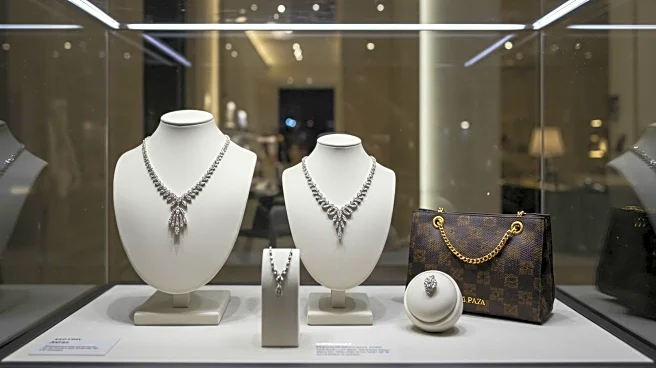What's Happening?
Deji Plaza, a luxury shopping mall in Nanjing, China, has become a leading destination for high-end retail, surpassing significant sales milestones. Founded in 2006 by Wu Tiejun, the mall has seen its sales more than double from 10 billion renminbi in 2018 to 24.5 billion renminbi by 2024. This growth has positioned Deji Plaza as the highest-grossing retail project in Eastern China, surpassing competitors like SKP. The mall hosts prestigious brands such as Hermès, Chanel, Louis Vuitton, and Dior, making it a unique luxury hub in the region. Deji Plaza's strategy includes innovative retail concepts, such as the introduction of themed bathrooms and art installations, which have become tourist attractions. The mall's focus on customer experience and cultural integration has attracted a significant number of shoppers from outside Nanjing, contributing to its high foot traffic.
Why It's Important?
Deji Plaza's success highlights the evolving landscape of luxury retail, where customer experience and cultural engagement are becoming as crucial as the products themselves. This trend is significant for U.S. luxury brands and retailers looking to expand or maintain their presence in international markets. By understanding and adapting to local consumer preferences, as Deji Plaza has done, U.S. companies can enhance their competitiveness in the global luxury market. The mall's approach also underscores the importance of integrating art and culture into retail spaces, offering lessons for U.S. retailers on how to create unique shopping experiences that attract diverse customer bases. Additionally, the rise of Deji Plaza as a luxury destination reflects broader economic trends in China, which could influence global luxury market dynamics.
What's Next?
Deji Plaza plans to continue its expansion and innovation in retail experiences. The mall is set to open a new retail project targeting Gen Z shoppers, which will feature AI-powered security and humanless shopping experiences. This move indicates a shift towards more technologically advanced retail environments, which could set new standards for luxury shopping globally. As Deji Plaza continues to evolve, it may inspire similar developments in the U.S. and other markets, prompting retailers to explore new ways to engage with tech-savvy consumers. The ongoing expansion and adaptation of Deji Plaza's retail strategy will likely influence how luxury brands approach their market strategies, both in China and internationally.
Beyond the Headlines
Deji Plaza's integration of art and luxury retail reflects a broader cultural shift towards experiential shopping. This approach not only enhances customer engagement but also positions the mall as a cultural landmark, attracting visitors beyond traditional shopping motives. The emphasis on art and cultural experiences could lead to a reevaluation of how retail spaces are designed and utilized, potentially influencing urban development and cultural policy. Furthermore, Deji Plaza's success in attracting international brands and consumers may encourage other regions to develop similar luxury retail hubs, impacting global retail trends and economic strategies.








